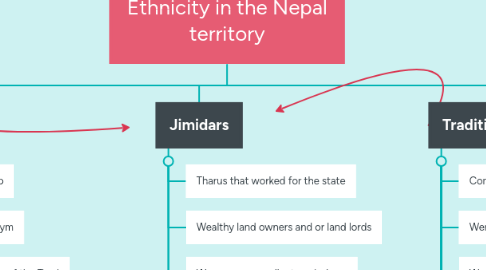Ethnicity in the Nepal territory
by Brandon Ficarra

1. Traditional/State
1.1. Common origin myth
1.2. Were originally one but became separated
1.3. Wants to reunite under the elites
1.4. More linguistic, cultural, historical, territorial ties to Rana Tharu than the Chitwan or Dang Tharus .
1.5. Not Thaurus
1.6. Speak Nepali, and Maithili, Bhojpuri, Awadhi
1.6.1. Politicians want to register many Maithili speakers so they can say they represent this group
1.7. A hierarchy enforced by the state, ranking different tribes. Tharu at the bottom.
1.7.1. Women can move up, by marrying into new tribes. However, uncommon
1.8. Tried to distinguish themselves from India by forming Nepal Federation of Nationalities / Tribes
1.9. By 1956 and onwards, elite tried to unite people in a pan-Thauran
1.9.1. Tried to hold meetings about how to integrate Thaurus to other groups. Nothing was really accomplished.
1.10. Strong emphasis on stopping child marriage
1.11. Their entire social structure was based off things picked up by other groups like the caste system from India or having communists among their ranks
2. Thaurus
2.1. Nepali citizenship
2.2. Common ethnonym
2.3. Common territory of the Tarai
2.4. Connections with people to north and south
2.5. Frontier people
2.6. Muluki Ain 1854 placed Tharu in category of enslaveable caste.
2.7. If united, are a large group
2.8. More Hinduized
2.9. See themselves as backward
2.10. Most Tharu own land
2.11. Education is the key to uplift them out of poverty
2.12. Have issues with the SABHA (worker training organization)
2.13. Wants the Thauru language acknowledge as an actual language (in reality its just a collection of other dialects)
2.14. Their social structure is mired in tradition from the day they were born till the day they die. They can work with neighbors but don't expand much beyond it and hate other outside influence.
3. Jimidars
3.1. Tharus that worked for the state
3.2. Wealthy land owners and or land lords
3.3. Were revenue collectors, judges, torturers, and religious leaders
3.4. Only another Jimidar can counter a Jimidar's punishment


